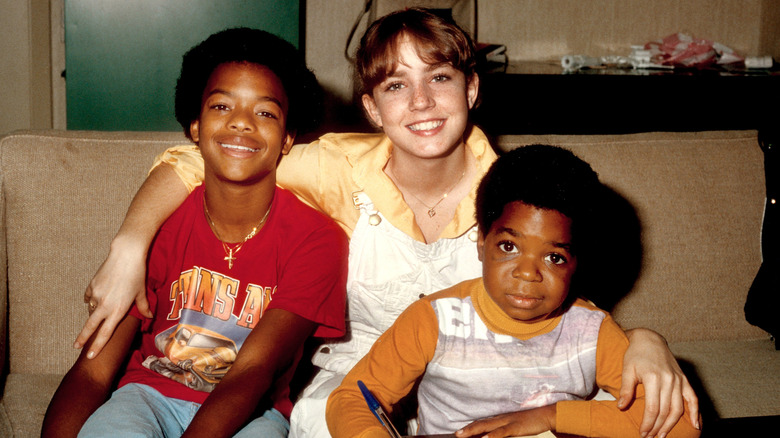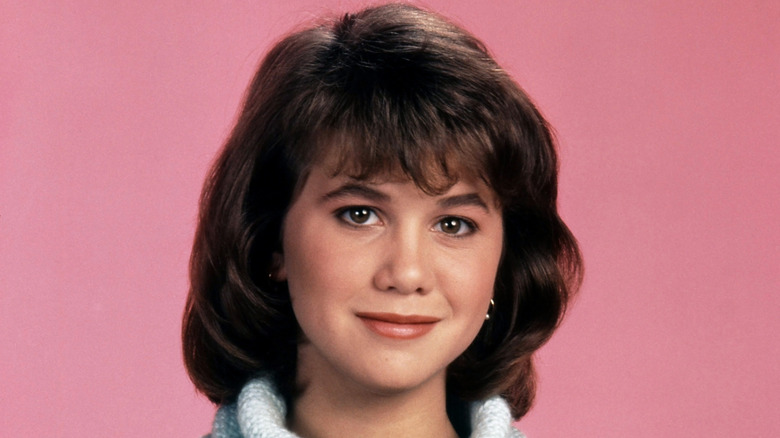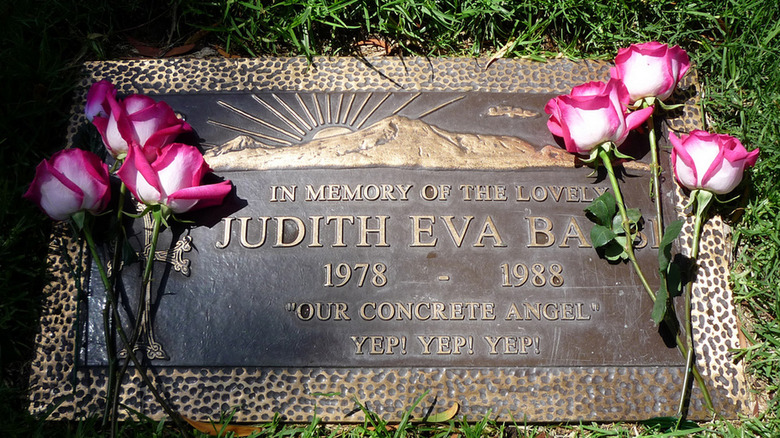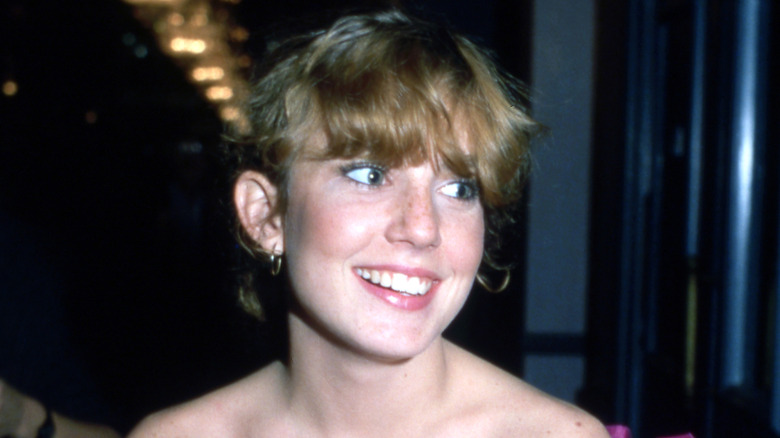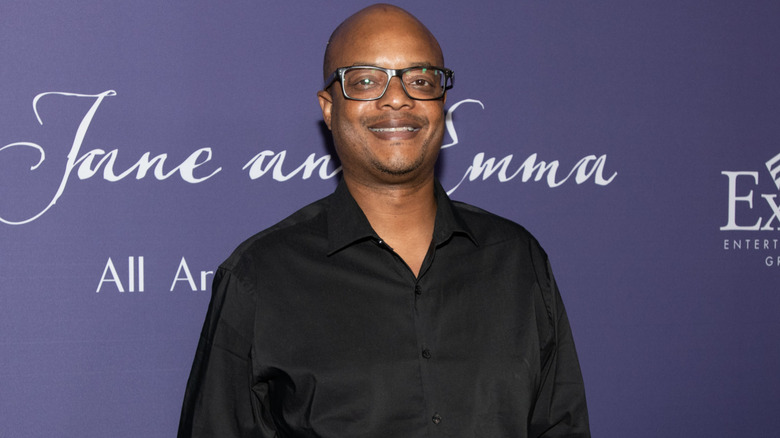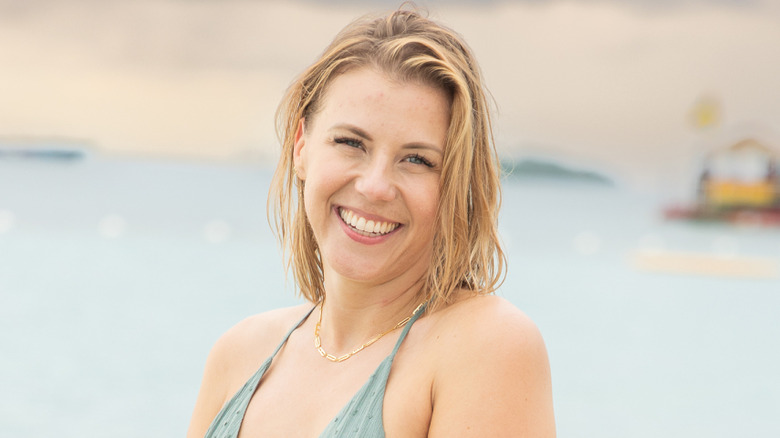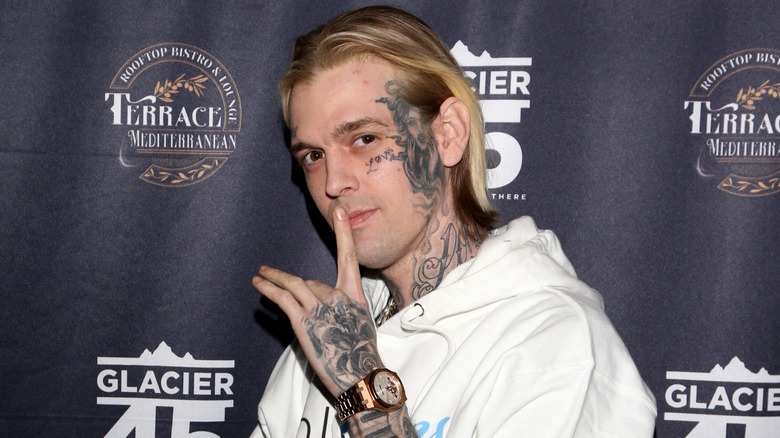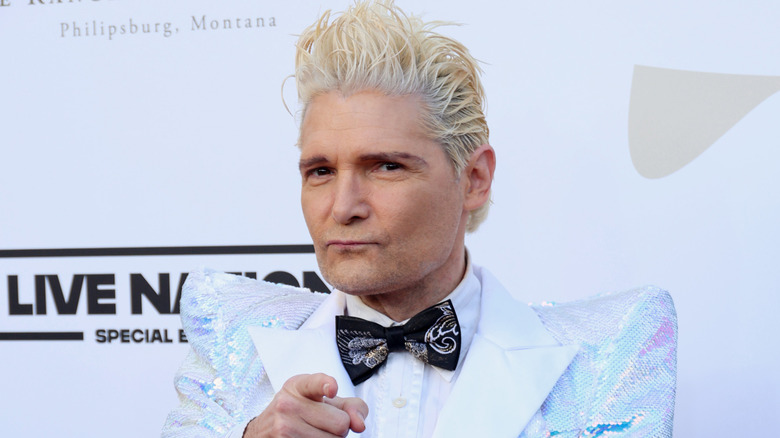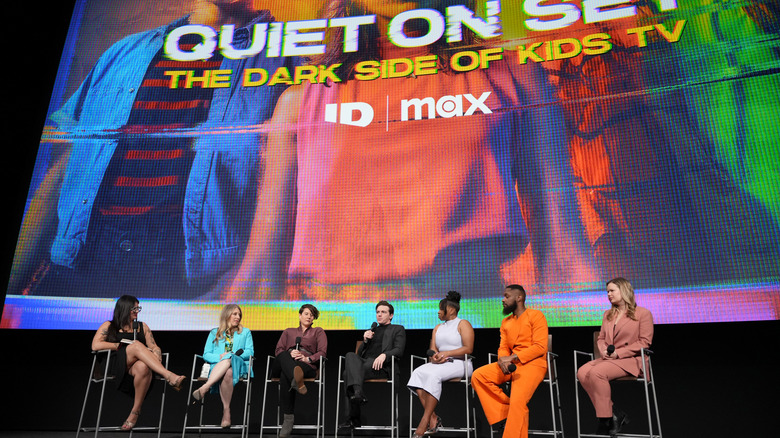Child Star Controversies That Completely Shook The TV Industry
We may receive a commission on purchases made from links.
The following article includes mentions of suicide, addiction, and eating disorders; and allegations of child abuse, sexual assault, and domestic abuse.
Hollywood and the TV industry are some of the only places where child labor is widely accepted, and while efforts are made to protect children from the problems that come with fame, there have nonetheless been countless child star controversies throughout the industry. In the wrong hands, Hollywood — just like Wall Street, the government, and any institutional network shielded by massive wealth and power — can become a cesspool of tragedy and depravity, one in which children often swim.
Considering the limited rights of children, there have been issues with child actors from the very start. Jackie Coogan, known as the original popular child actor, is a representative case in point. Coogan made a lot of money as a child star that was then squandered and misspent by his mother and stepfather, leaving him practically broke. He sued his parents, and the case resulted in the first major legislation for child actors, the Coogan Law, which mandates that children's employers set aside payment in a trust and enforce time off and schooling hours.
Money problems are just the tip of the iceberg for child stars, though, with fame and wealth providing access to drugs, shady hangers-on, and everything in between. It's no wonder there are so many former child stars who went off the deep end, especially in the TV industry. Many children simply can't handle the amount of stress, attention, expectations, and money that comes with fame, resulting in seemingly endless stories of wasted youth, broken lives, and controversies that shook the world of television.
Jennette McCurdy's abusive mother
Jennette McCurdy, a star of "iCarly," sounded the alarm about her experiences as a child and teen actor in her acclaimed memoir, "I'm Glad My Mom Died." McCurdy's book grappled with a childhood spent under an abusive mother who strongly pushed — if not forced — her into show business.
McCurdy grew up in a chaotic and dirty house due to her mother Debra's incessant hoarding. Her mother was seemingly obsessed with infantilizing Jennette, insisting on bathing her in the bathroom even as a teenager, along with evasively inspecting her in sexually abusive ways. She prevented Jennette from dating, and when the child star was photographed secretly dating someone, her mother left voice messages on her phone calling her an "ugly monster," a "s***," and a "floozy," demanding money before attempting to ruin her career (via The New York Times).
When Jennette reached puberty, her mother forced her to eat less to stunt her body's growth and stay childlike, resulting in an eating disorder that lasted through her run on "iCarly." That show's creator, Dan Schneider (whom she's supposedly referring to as "The Creator" in her book), also allegedly tried to get her to drink alcohol and gave her awkward massages.
Tracey Gold's growing pains
The story of Tracey Gold and her journey with an eating disorder is tragic but also indicative of many women's experiences in the TV industry. Gold suffered constant humiliation while playing Carol Seaver on the TV show "Growing Pains," with the writers and producers putting increasingly mean "fat jokes" about her into the show.
On the podcast "Let's Be Clear with Shannen Doherty," Gold recounted approaching the writers, asking, "Can we negotiate? It hurts my feelings." The writers wouldn't relent. "You're not talking just about Carol anymore. You're talking about me, Tracey Gold. And now I have to be in front of an audience that's laughing at me and my body and my weight, and it became tough." The show's producers even called Gold's father (who was also her agent) and mandated that she lose weight. She was pushed into a diet of just 500 calories a day. Her weight loss was reflected in "Growing Pains," with Carol becoming the homecoming queen, reinforcing those sick body image standards.
Gold developed anorexia, and when the show's writers cruelly changed their minds and wanted her to gain weight, she simply couldn't. She was too deep into her disease, the show was eventually canceled, and she entered inpatient treatment. When Gold bravely came out about her story in the '90s, appearing on the cover of People, it shook the TV industry.
Judith Barsi's short, tragic life
Many child stars, especially very young ones, are pushed into the industry by so-called "stage moms" and other exploitative caregivers who live vicariously through their children or seek to profit from them. They become helpless pawns played by cruel parents. Such was the case with the tragic fate of child star Judith Barsi, whose mother groomed her to be in Hollywood ever since she was a child. Little Judith found fame at 5 years old and was put through the wringer, making nearly 100 commercials and starring in numerous TV movies, shows, and films over the next five years.
It was an open secret that Judith came from a chaotic home. Her alcoholic father, Joe Barsi, was known to be physically and verbally abusive, frequently threatening the family; as one of his friends told the Los Angeles Times, he "told me 500 times he was going to kill his wife." Judith developed a nervous disorder as a result, pulling out all of her eyelashes in the process. "I'm afraid to go home," Judith reportedly told family friends she was visiting. "My daddy is miserable. My daddy is drunk every day and I know he wants to kill my mother." Mere months after saying this, 10-year-old Judith and her mother were murdered by her father, who then died by suicide.
Dana Plato's desperation
The tragic story of Dana Plato was a result of yet another child star whose controlling mother pushed her into acting with a relentless work schedule. In her childhood, Plato appeared in well over 200 commercials. The pressure was immense, and only increased when she secured the role of Kimberly Drummond on the hit show, "Diff'rent Strokes." Plato overdosed on Valium at 14 within the first year of the show, according to an extensive profile in People. The next year, she began showing up to the "Diff'rent Strokes" set drunk.
Plato's character was written off the show when she became pregnant with a son at 18, something she said made her shunned by Hollywood. She made money from posing naked for Playboy and starring in softcore erotic dramas, including "Different Strokes: The Story of Jack & Jill ... and Jill." Addicted to Valium and desperate for cash, Plato robbed a video store, leading to her first arrest. She later found herself in trouble for forging Valium prescriptions. She lost custody of her son (who later died by suicide) and began living in a mobile home.
When a woman claiming to be Plato's female lover called Howard Stern's show claiming she was still addicted to drugs, Plato appeared on Stern's show to defend herself and attempt a career relaunch. Instead, callers mocked her as a has-been and a lesbian. The day after appearing on the show, Plato died of an overdose of Valium and Lortab at the age of 34, which was later ruled a suicide.
Todd Bridges survived Diff'rent Strokes
Todd Bridges was another troubled child star from "Diff'rent Strokes," a series which seems haunted by the sad fates of child stars Bridges, Dana Plato, and Gary Coleman, who played the children of Phillip Drummond. Al Burton, the show's creative supervisor, recalled running into Plato at a party in 1990, where she joked (via People), "I just posed nude for Playboy, Gary is suing his parents, Todd was arrested. That Drummond sure was a terrible father." Bridges' youth followed the familiar playbook of many other child actors — he had a traumatic childhood as a result of his alcoholic father, he was sexually abused as a child, and he has stated that Dana Plato introduced him to alcohol, marijuana, and sex when he was 14, beginning his decades-long abuse of drugs.
Following his time on "Diff'rent Strokes" — where he and Gary Coleman had a bitter feud – Bridges went on to use meth and cocaine, leading to multiple arrests. The most noticeable of these was a trial for attempted murder where he was represented by Johnnie Cochran, who would become a household name in 1995 when he represented O.J. Simpson. Bridges was accused of attempted murder of a drug dealer in 1989, but was acquitted (interestingly, Cochran partially blamed Hollywood's exploitative treatment of children in his defense). Bridges was arrested again in 1993 for gun and drug charges, which seemed to be the final straw – the actor quit drugs that year and has stayed sober.
Amanda Bynes broke up with Hollywood
While Amanda Bynes worked closely with the aforementioned Nickelodeon producer and alleged predator Dan Schneider, she has never accused him nor anyone else of abuse (except her own father in a disturbing tweet she later recanted and apologized for). Instead, it seems that Hollywood broke Bynes, and she broke up with it. It was an especially noticeable decline considering how Bynes was always seen as a "model" child star, one with supposedly immaculate behavior and a spotless reputation, at least until 2010.
In actuality, that kid-friendly image has often led child stars to rebel and gravitate toward more adult, provocative behavior, as was also the case with Miley Cyrus, Lindsay Lohan, and many others. Bynes tried to shed that reputation, with one Nickelodeon executive telling The Hollywood Reporter, "Everybody had her as a goody-goody. She couldn't break out of that genre." Bynes' big attempt was an adult role in the raunchy 2011 comedy "Hall Pass," but Bynes was reportedly unprepared.
"When I was doing 'Hall Pass,' I remember being in the trailer and I used to chew the Adderall tablets," Bynes told Paper Magazine. "I remember chewing on a bunch of them and literally being scatterbrained and not being able to focus on my lines or memorize them for that matter." She walked off the film (or was fired, depending on who you ask) and hasn't appeared in a film or series since, though Bynes has become infamous for her disturbing X (formerly known as Twitter) messages.
Jodie Sweetin turned to drugs after Full House
It's sadly easy to deduce a tragic template for the lives of child stars: pushy or abusive parents, sexual assault as a child, dependency on alcohol or drugs from an early age, the development or exacerbation of mental health issues, a series of low points precipitating a career collapse. The tragic details of Jodie Sweetin's life checked all the boxes since the very beginning, with both of her parents getting arrested before she was 1 year old; her biological father died soon after in a prison riot.
Sweetin suffered sexual assault as a child, coming out about the incident to stand with survivors in an Instagram post. "I was the girl who never reported because I blamed myself," wrote Sweetin. "I was the woman who never reported because I didn't want to go through the pain and ridicule." She was also bullied throughout middle school and high school, with cruel kids teasing her for playing Stephanie Tanner in the hit show "Full House." She was 5 years old when she began the show and was 13 when it was canceled, leaving her feeling adrift. She began drinking soon after, with Sweetin going on to abuse drugs, something which led to multiple divorces. "I don't get tattoos, I get husbands," half-joked Sweetin (via The Rocket). After years of dependency, an emergency custody investigation in 2008 was Sweetin's final straw, and she has reportedly been sober ever since.
Johnny Lewis' final violent days
Johnny Lewis began his TV career as a teenager, eventually becoming most famous for portraying Kip "Half Sack" Epps in the series, "Sons of Anarchy." Despite being an excellent actor, his behavioral problems (combined with his mental health issues and drug dependency) made him reportedly difficult to work with. After two seasons, Lewis asked to be written out of the show. "He told us he left because the show was getting into gratuitous violence," his father, Michael Lewis, told Los Angeles Magazine.
Soon after departing "Sons of Anarchy" in 2009, Lewis went through a rough custody battle for his only daughter, which he ended up losing. A motorcycle accident in October 2011 was the real beginning of the end, though. He suffered a head injury, but refused MRIs, which some have suspected may have led to him developing a mental disorder or disease.
Lewis was arrested three times within one year, ultimately spending more than two months in jail for attacking two men with a Perrier bottle. When he was released on September 21, 2012, his probation officer wrote, "[Lewis] will continue to be a threat to any community he may reside." Five days later, he murdered his 81-year-old landlady and her cat before falling off her roof and to his death. Johnny Lewis' autopsy determined that no drugs or alcohol were in his system.
Aaron Carter's family calamity
Aaron Carter became a successful singer at just 9 years old and guest starred in shows like "7th Heaven" as a child. Aaron's brother, Nick Carter, found fame as a member of the Backstreet Boys. Their mother also served as their manager, reportedly mismanaging their money. "I feel betrayed by my own mother," said Aaron in a statement (via Today), announcing he was removing her from his team.
Financial issues were only one element of Aaron's troubled youth, something which was explored in the 2006 reality series, "House of Carters," which featured physical fights between Aaron and his siblings. "My sister raped me from the age of 10 to 13 years old when she wasn't on her medications," alleged Aaron in a tweet on X, "and I was abused not only sexually by her but by my first two back up dancers when I was 8 years old. And my brother abused me my whole life." Aaron made these claims amid news that his brother Nick had put out a restraining order against him, claiming Aaron had threatened him and his wife.
Sometimes death haunts a whole family of child stars, as was the case with the Carters and their dark family secrets. Leslie Carter slipped in her bathroom while on a variety of drugs and later died in her sleep in 2012; Bobbie Jean Carter died in her bathroom with a mixture of fentanyl and methamphetamine in her system in 2023; Aaron Carter died in his bathtub with Xanax in his system in 2022.
Corey Feldman exposed the abusers of Hollywood
Say what you will about Corey Feldman, but he has survived. Like many child stars, Feldman had a mentally volatile and abusive mother who would lock him in his room to learn lines and song lyrics. "She would cry and fidget and whine and sometimes scream and fume and kick," wrote Feldman in his 2013 memoir, "Choreography." "Those were the worst days, when her moods became like black holes, sucking the life from every corner of the house into that cold, dark room." Feldman recalled a time when he was fired from a movie set as a child and how his mother reacted. "'How could you f***ing do this to me?' she screams,'" he recounted. "She is out of control, wild-eyed, like an animal ... 'You know I need this f***ing money. I will kill you. I will f***ing kill you, you worthless piece of s***.'"
Feldman has alleged that he and his close friend, Corey Haim, experienced sexual abuse as childhood actors, with Feldman sounding the alarm about pedophilia in Hollywood years before Me Too or "Quiet on Set." He told Nightline in 2011, "The No. 1 problem in Hollywood was and is and always will be pedophilia. That's the biggest problem for children in this industry ... It's the big secret." Feldman even produced and appeared in a 2020 documentary titled "My Truth: The Rape of 2 Coreys," which detailed his and Haim's abuse and named actor Charlie Sheen as one of many alleged abusers.
Child stars spoke up with Quiet on Set
Speaking of "Quiet on Set," that ID docuseries has triggered new conversations about child actors and Hollywood, exposing some of Nickelodeon's biggest scandals and the child stars who were affected. While documentaries like "An Open Secret" had previously attempted to reveal the predatory behavior of many men in Hollywood and the TV industry, 2024's "Quiet on Set: The Dark Side of Kids TV" seemed to strike a louder chord, one which shook the TV industry to its core.
Looking at the shadier side of Nickelodeon at the turn of the century, "Quiet on Set" explored the production of shows such as "Zoey 101," "iCarly," and "Drake & Josh," all created by Dan Schneider. Schneider, dialogue coach Brian Peck, production assistant Jason Handy, animator Ezel Channel, and other alleged predators were accused of grooming child stars in some cases and outright sexually assaulting them in others, as was the case with Peck when he abused Drake Bell.
The series features interviews with child stars Alexa Nikolas, Leon Frierson, Bryan Hearne, Katrina Johnson, Giovonnie Samuels, Kyle Sullivan, Shane Lyons, and more. While chronicling tragedies and abuses, the massive popularity of the docuseries is ultimately a positive social signal, one which indicates that the culture at large is ready and willing to listen to child stars and, hopefully, fight to protect them.
If you or anyone you know needs help with addiction issues, is struggling or in crisis, need help with an eating disorder, may be the victim of child abuse, has been a victim of sexual assault, or is dealing with domestic abuse, contact the relevant resources below:
- Visit the Substance Abuse and Mental Health Services Administration website or contact SAMHSA's National Helpline at 1-800-662-HELP (4357).
- Call or text 988 or chat 988lifeline.org.
- Visit the National Eating Disorders Association website or contact NEDA's Live Helpline at 1-800-931-2237. You can also receive 24/7 Crisis Support via text (send NEDA to 741-741).
- Contact the Childhelp National Child Abuse Hotline at 1-800-4-A-Child (1-800-422-4453) or contact their live chat services.
- Call the National Domestic Violence Hotline at 1−800−799−7233. You can also find more information, resources, and support at their website.

